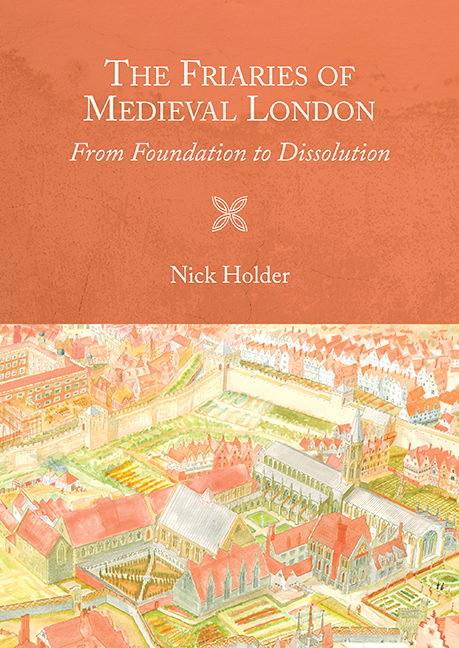Book contents
- Frontmatter
- Contents
- List of Illustrations and Tables
- Contributors
- Acknowledgements
- Abbreviations
- Introduction
- Part I The Nine London Friaries
- Part II The London Friars and their Friaries
- 10 Churches
- 11 Precincts and the Use of Space
- 12 Architecture and Architectural Fragments of the London Friaries
- 13 Floor Tiles and Building Materials from the London Friaries
- 14 Water Supply
- 15 Economy
- 16 Spiritual Life and Education in the London Friaries
- 17 Burial and Commemoration in the London Friaries
- 18 London Friars and Londoners
- 19 Dissolution
- Conclusions
- Timeline
- Bibliography
- Index
- Miscellaneous Endmatter
15 - Economy
from Part II - The London Friars and their Friaries
Published online by Cambridge University Press: 16 May 2018
- Frontmatter
- Contents
- List of Illustrations and Tables
- Contributors
- Acknowledgements
- Abbreviations
- Introduction
- Part I The Nine London Friaries
- Part II The London Friars and their Friaries
- 10 Churches
- 11 Precincts and the Use of Space
- 12 Architecture and Architectural Fragments of the London Friaries
- 13 Floor Tiles and Building Materials from the London Friaries
- 14 Water Supply
- 15 Economy
- 16 Spiritual Life and Education in the London Friaries
- 17 Burial and Commemoration in the London Friaries
- 18 London Friars and Londoners
- 19 Dissolution
- Conclusions
- Timeline
- Bibliography
- Index
- Miscellaneous Endmatter
Summary
IF the prime purpose of every monastic order was prayer – with the additional component of preaching in the case of the friars – there had to be an economic infrastructure to support this. Even St Francis could not pray and preach on an empty stomach with no shelter for the night; this latter aspect was even more important in late medieval England than on a warm night in thirteenth-century Umbria.
If we were studying a Benedictine monastic house we would naturally seek records of the monastic officers who administered the kitchen, the church or the guest wing. These obedientiaries’ accounts are particularly well preserved at Benedictine houses that were also cathedrals, such as Norwich or Durham, or in monasteries that converted to a cathedral after the Dissolution, such as Peterborough or Westminster. Unfortunately no such records survive from English friaries; indeed, it is uncertain to what extent friaries even had such officers. However, the rather scattered sources certainly do make mention of friars with administrative roles, even if the structure was not quite as formally organised as at a large Benedictine institution. At Grey Friars, for example, there were friars who served as a physician (Eric de Vedica, specified as an ‘obediencer’ of the priory), a gardener (Walter Roben) and a butler (Geoffrey Turner), as well as an almoner and an infirmarer.
Reconstructing the finances of Austin Friars
Given the lack of any surviving obedientiaries’ rolls for English friaries – if indeed this sort of record was kept – one must make do with the sources that do survive. The starting point chosen here is the chance survival of a summary account showing money paid by the English province of the Austin Friars to the order's headquarters in Rome. The document of 1522 records money paid by the prior of the London Austin Friars, Edmund Bellond, to an Italian agent, Raphael Maruffus, for transfer to the papal Curia at Rome. The financial transfer seems to have been the result of a special fundraising exercise by Bellond, who had obtained a papal indulgence in order to raise money for a building project (probably not at the London house).
- Type
- Chapter
- Information
- The Friaries of Medieval LondonFrom Foundation to Dissolution, pp. 251 - 257Publisher: Boydell & BrewerPrint publication year: 2017

